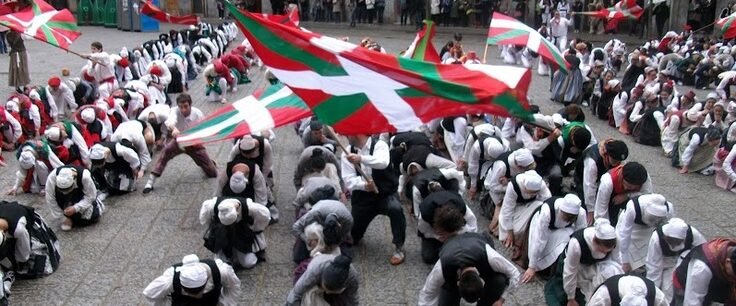An Introduction to Basque Culture and People
Nestled between the rugged coastlines of northern Spain and the southwestern fringes of France, the Basque region stands as a testament to cultural resilience and distinctiveness. Spanning approximately 20,947 square kilometers, this picturesque area, known as Euskal Herria by natives, has nurtured a unique culture that has resisted the homogenizing tides of modern Europe.
One of the most captivating attributes of the Basque people is their language, Euskara. Unlike any other language spoken in Europe, Euskara’s origins remain shrouded in mystery, disconnected from any known language family. This linguistic anomaly not only enriches the cultural tapestry of the Basque but also serves as a robust bulwark of their identity. For the Basque, preserving Euskara is more than linguistic pride; it’s a profound connection to their ancestors and an enduring testament to their distinct heritage.
The traditions and societal norms of the Basque people further distinguish them from their Iberian and French neighbors. Characterized by a deep sense of community, these traditions emphasize unity, cooperation, and mutual respect. From the vibrant festivals like Aste Nagusia in Bilbao to the solemnity of local church gatherings, the Basque have crafted a social fabric woven with threads of togetherness and collective joy. Ceremonial practices, dances, traditional sports, and gastronomy are not merely events but communal celebrations that strengthen the bonds among people.
Historical accounts suggest that the Basques have inhabited their mountainous homeland for millennia, displaying a remarkable capacity for adaptation and resistance. Whether faced with Roman incursions, medieval conquests, or the pressures of modern statehood, the Basque have maintained a steadfast dedication to their cultural sovereignty. This strong sense of identity, bolstered by an unwavering commitment to their language and traditions, has allowed the Basque people to navigate and survive through tumultuous periods of historical change.
Understanding the importance of communal activities within Basque culture necessitates recognition of their historical and contemporary significance. The spirit of togetherness is the lifeblood of this resilient and vibrant people, providing continuity from one generation to the next and enriching the colorful mosaic that is Basque culture.
Basque Gatherings: Festivals, Sports, and Culinary Traditions
Basque culture thrives on its rich tradition of gatherings, where communities come together to celebrate, compete, and share. Among the most notable of these events are festivals such as Aste Nagusia and Tamborrada. Aste Nagusia, or «Great Week,» is a vibrant, week-long festival held in Bilbao every August, characterized by colorful parades, fireworks, and traditional music. Tamborrada, held in San Sebastián, is marked by a procession of participants dressed in chef and soldier costumes, playing drums and barrels to commemorate the city’s resilience during historical sieges.
Sports also play a vital role in Basque gatherings, particularly traditional activities like pelota and regattas. Pelota, a fast-paced ball game, is played in frontons (special courts) across the region and remains a symbol of Basque identity and pride. Meanwhile, regattas—competitive rowing events—highlight the coastal community’s deep maritime heritage. These sports gatherings not only serve as a form of entertainment but also reinforce community ties and shared heritage.
At the heart of Basque gatherings is the culinary tradition, noted for its unique flavors and social significance. Pintxo bars, found through cities and towns, offer small, delectable snacks that encourage socializing over food and drink. Further, txokos—gastronomic societies—are private groups where members cook, eat, and converse together, fostering a strong sense of community through the shared love of food. These culinary events emphasize the importance of conviviality and hospitality in Basque culture.
The communal spirit is perpetuated through these gatherings, bridging generational divides and reinforcing cultural continuity. Such events offer more than just entertainment; they provide a platform for shared experiences and collective identity, strengthening the bonds within the Basque community and ensuring the traditions are passed down through the generations.



